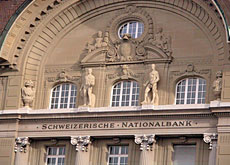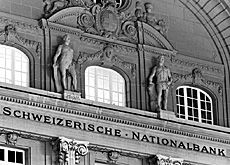National Bank raises interest rate once more

The Swiss National Bank (SNB) raised its key interest rate on Thursday, as expected, by 25 basis points for the sixth consecutive quarter.
It also warned that to ensure price stability, it would probably have to continue its policy of rate rises.
The bank increased the target range for its benchmark rate, the three-month Swiss franc London Interbank Offered Rate or Libor, to 1.75 – 2.75 per cent, aiming for the midpoint of 2.25 per cent.
In a statement from Zurich, the bank said by raising the target range, it was ensuring that the inflation outlook would remain “favourable”.
It said Thursday’s decision was a sign the bank was maintaining its monetary policy course of gradual normalisation.
It forecast an inflation rate of 0.5 per cent for this year from its last prediction of 0.4 per cent. It believes inflation will rise to 1.4 per cent in 2008 and 1.6 per cent in 2009.
“Excellent shape”
The bank described the economy as in “excellent shape” and maintained its growth forecast of two per cent for 2007. The BAK Basel Economics research organisation on Thursday forecast a figure of 2.1 per cent.
Many economists had expected the SNB’s move and are now predicting a further such step in June.
“I think it’s no surprise for any market observer that they leave the door open still for more rate hikes,” commented Janwillem Acket, chief economist at Bank Julius Baer.
“I think the important element is that they have adjusted their inflation projection, and the fact that they took up the previous forecast of 0.9 per cent to 1.4 per cent for inflation in 2008 shows that there’s more to come.”
In another reaction the chief economist of economiesuisse (Swiss Business Federation), Rudolf Walser, said there had to be good reasons for further rate rises because there was no risk of inflation for the next three years.
The bank, however, said its inflation forecast was subject to “some uncertainty” because economic developments might be more “vigorous” than expected.

More
Swiss National Bank
Price pressure?
It added that the recent softening of the Swiss franc against the euro might in time lead to stronger price pressure on imported European goods.
A further weakening of the Swiss franc would increase this risk even more, the bank said.
Despite current inflation rates of zero, the SNB is concerned about strong economic growth and the long-term weakness of the Swiss franc affecting price stability.
In December the SNB raised the target range to 1.5-2.5 per cent, with the benchmark mid-point at two per cent.
swissinfo with agencies

More
economiesuisse
Growth forecasts for the Swiss economy in 2007:
BAK Basel Economics: 2.1%
State Secretariat for Economic Affairs (Seco): 1.7%
Swiss National Bank (SNB): 2%
Institute for Business Cycle Research (KOF): 2.1%
UBS: 1.5%
Credit Suisse Group: 2%
OECD: 2.2%
The Libor (London Interbank Offered Rate) is a key tool of the Swiss National Bank.
It designates the interest rates fixed every business day by the British Bankers’ Association.
These are the rates at which major banks are prepared to grant unsecured money market loans to each other.
The SNB notes that after having lost ground against the euro over some time, the Swiss franc has recovered slightly of late.
The exchange rate is important to the National Bank insofar as it influences the inflation outlook, either directly via the prices of imported goods or indirectly via economic activity.
So far, the exchange rate has had no notable effect on inflation.

In compliance with the JTI standards
More: SWI swissinfo.ch certified by the Journalism Trust Initiative



You can find an overview of ongoing debates with our journalists here . Please join us!
If you want to start a conversation about a topic raised in this article or want to report factual errors, email us at english@swissinfo.ch.